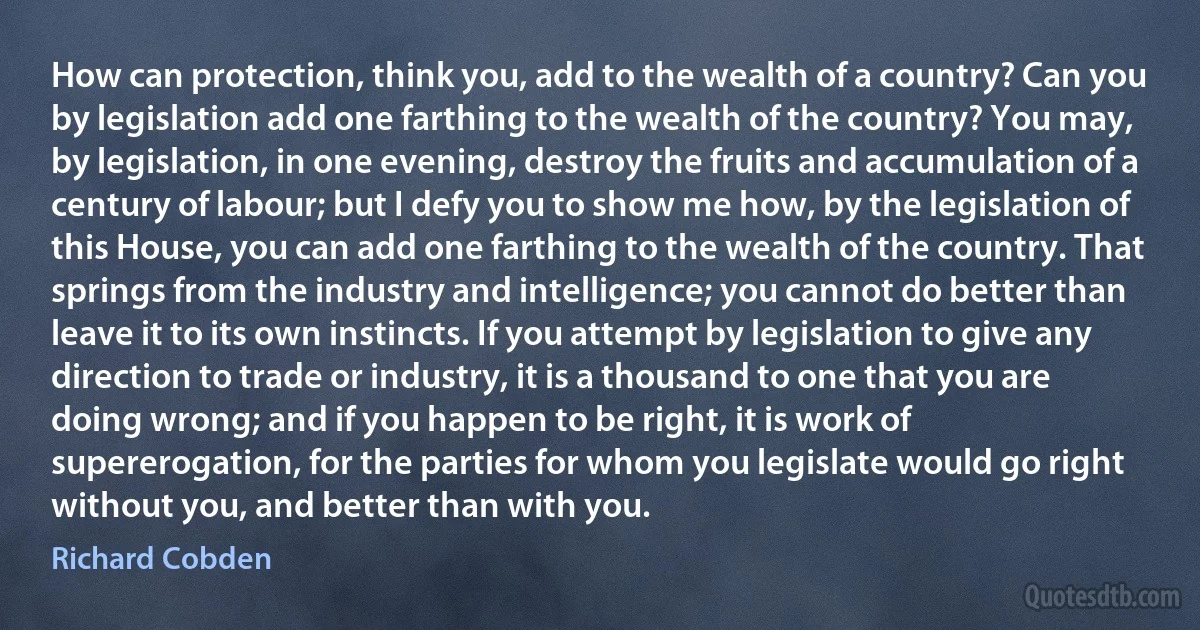
How can protection, think you, add to the wealth of a country? Can you by legislation add one farthing to the wealth of the country? You may, by legislation, in one evening, destroy the fruits and accumulation of a century of labour; but I defy you to show me how, by the legislation of this House, you can add one farthing to the wealth of the country. That springs from the industry and intelligence; you cannot do better than leave it to its own instincts. If you attempt by legislation to give any direction to trade or industry, it is a thousand to one that you are doing wrong; and if you happen to be right, it is work of supererogation, for the parties for whom you legislate would go right without you, and better than with you.
Richard CobdenRelated topics
add attempt century country direction evening house industry intelligence leave legislation right show think thousand trade wealth work wrong labourRelated quotes
I therefore fearlessly challenge the verdict which this House, as representing a political, a commercial, a constitutional country, is to give on the question now brought before it; whether the principles on which the foreign policy of Her Majesty's government has been conducted, and the sense of duty which has led us to think ourselves bound to afford protection to our fellow subjects abroad, are proper and fitting guides for those who are charged with the government of England; and whether, as the Roman, in days of old, held himself free from indignity when he could say Civis Romanus sum; so also a British subject, in whatever land he may be, shall feel confident that the watchful eye and the strong arm of England will protect him against injustice and wrong.

Henry Temple, 3rd Viscount Palmerston
The time was, when I was a boy, when people hardly dreamed that the day would come when there would be large numbers of Members in this House who could not afford to perform their duties here unless they had an allowance; but I think, looking at the whole Continent of Europe, that, the more the basis of our liberty and our Constitution is broadened, the better for our country. Would anyone who remembers the old days here go back to them and give up what we have gained? This Chamber, the most famous Chamber in democratic government in the world, is now open to all, and, once you admit that everybody has a right to be elected to this House if he can, you cannot logically create or leave a financial bar.

Stanley Baldwin
It was not until 1869 that I met him Manet again, but this time, we became friends immediately. From the first meeting, he invited me to join him every evening in a café of the 'Batignolles' where he and his friends would gather to talk at the end of a day spent at their studios. I would meet there, Fantin-Latour and Cézanne, Degas - who arrived shortly afterwards from Italy, the art critic Duranty, Emile Zola who was just starting-off in the literary world and a number of others. I would take Sisley, Bazille and Renoir. There was nothing more interesting than these discussions with their perpetual differences of opinion. Our mind and souls were stimulated.. .One would always leave, all the better immersed, the will stronger, our thinking more defined and clear.

Claude Monet
When we think of eternity, and of the future consequences of all human conduct, what is there in this life that should make any man contradict the dictates of his conscience, the principles of justice, the laws of religion, and of God? Sir, the nature and all the circumstances of this trade are now laid open to us; we can no longer plead ignorance, we can not evade it; it is now an object placed before us, we can not pass it; we may spurn it, we may kick it out of our way, but we can not turn aside so as to avoid seeing it; for it is bro directly before our eyes that this House must decide, and must justify to all the world, and to their own consciences, the rectitude of the grounds and principles of their decision.

William Wilberforce
It was in the attempt to ascertain the interrelationships between species that experiments n genetics were first made. The words "evolution" and "origin of species" are now so intimately associated with the name of Darwin that we are apt to forger that the idea of common descent had been prominent in the mnds of naturalists before he wrote, and that, for more than half a century, zealous investigators had been devoting themselves to the experimental study of that possibility. Prominent among this group of experimenters may be mentioned Koelreauter, John Hunter, Herbert Knight, Gartner, Jordan. Naudin, Godron, Lecoq, Wichura--men whose names are familiar to every reader of Animals and Plants unders Domestication.

William Bateson
